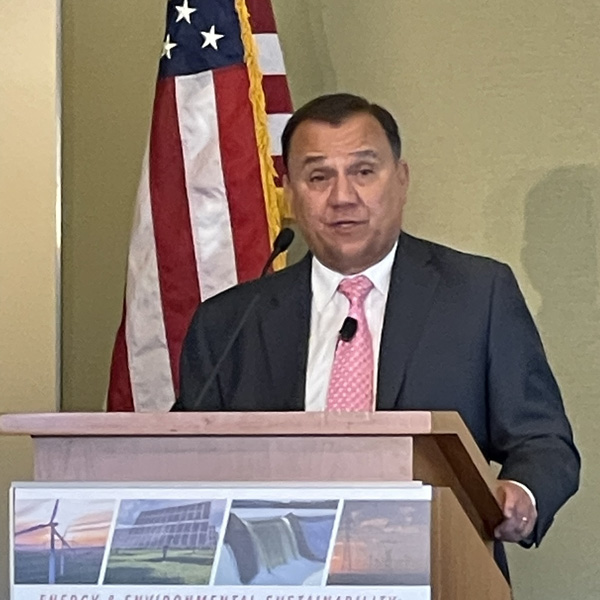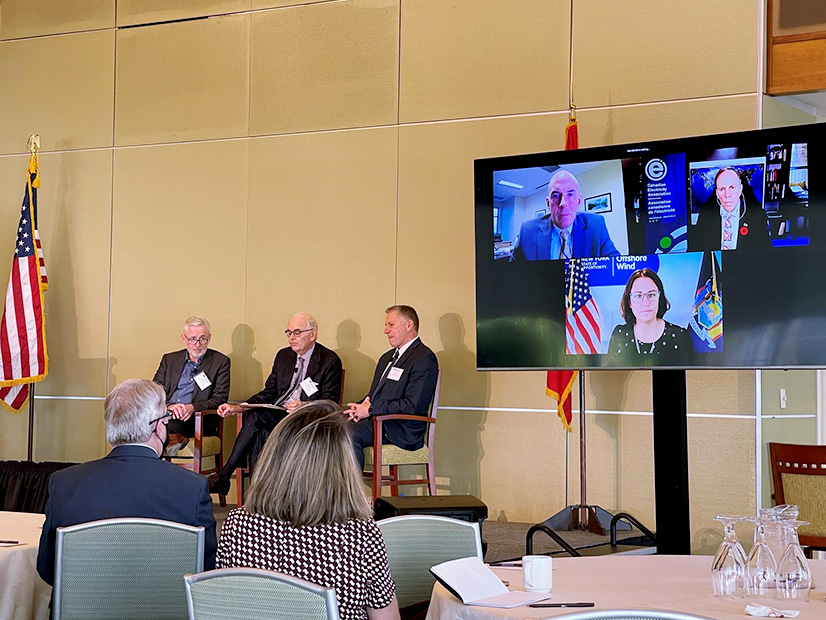
BOSTON — Ideas to build out the energy infrastructure in New England are plentiful. Still, concerns remain about the execution of potential projects to address the region’s ambitious climate change goals in addition to reliability.
American and Canadian business and government officials addressed the ideas-to-execution paradox during the New England-Canada Business Council’s 29th Annual Executive Energy Conference on Nov. 4-5.
The recent referendum rejection by Maine voters of the New England Clean Energy Connect transmission line was top on attendees’ minds.
The following is some of what we heard during the two-day event.
NECEC Project Vote
Voters in Maine went to the polls on Nov. 2, and a majority of them cast ballots to block construction of NECEC’S 145-mile transmission line through western Maine to deliver 1,200 MW of hydropower from Quebec to Massachusetts. However, on Nov. 3, Avangrid, the parent company of project developer Central Maine Power, filed a lawsuit in Maine Superior Court challenging the constitutionality of the referendum. (See Maine, NY Voters Prioritize Conservation on Election Day.)
 Avangrid CEO Dennis Arriola | © RTO Insider LLC
Avangrid CEO Dennis Arriola | © RTO Insider LLCSpeaking on a panel Friday, Avangrid CEO Dennis Arriola did not pull any punches about the future of the $1 billion project, which he said will be built on existing rights-of-way and commercial logging lands. NECEC, Arriola said, is good for the economy and environment and is “respectful of the local lands where the transmission lines are going to go.”
“The arguments that this project is doing really bad things to the forest, and everything, is totally false,” Arriola said. “I think that the narrative has been manipulated by, candidly, some characters that will be on the losing end of the energy transition.”
Arriola did not mention any specific “characters” by name.
More baseload fuels are needed to complement the intermittent electricity from offshore wind and solar, according to Arriola. It is essential to understand, he added, that “especially here in the Northeast,” projects specific to transmission have been blocked by companies that only care about “the bottom line.”
“When you look at what we need in this country, we don’t just need the renewables, we don’t just need more battery storage, we don’t just need more green hydrogen, we need a lot of transmission to be able to transport that clean energy to where it’s needed,” Arriola said.
If the U.S. and New England are serious about hitting “bold, audacious goals for carbon reduction” and getting to net-zero emissions in the next 15-30 years, he said, it will not happen without transmission.
“We’ve got to stop just talking about things,” Arriola said. “We got to put things into action.”
Government policymakers must “stand up and help push these projects along when they’re done right by the rules” established by them, he said.
Hydro-Québec can be “part of the solution in the Northeast,” Dave Rhéaume, senior director of development, strategy and commercial relations outside Québec, said during the panel discussion. He recognizes that whenever Hydro-Québec develops new deals, “obviously they come with very expensive transmission projects” like NECEC. As a renewable energy supplier, Hydro-Québec finds a market that requires renewables and sees the value proposition in building transmission lines that take energy in one direction … for now, Rhéaume said.
“We believe that in the long run, these lines won’t be unidirectional anymore,” he said. “They will be used to reduce the amount of curtailment periods in neighboring markets.”
Speaking of Tx
The referendum in Maine should be “sobering,” according to NERC CEO Jim Robb. He believes it put a “stick in the spokes of progress.”
There is a “robust transmission system” in New England, according to ISO-NE CEO Gordon van Welie. Still, there is more work to be done ahead of the integration of more renewable energy.

Eversource Energy operates about 50% of the transmission assets in the region, and Bill Quinlan, president of transmission and OSW projects for the utility, said that despite some of the headwinds for extensive energy infrastructure, “there are some paths forward.”
Quinlan cited Eversource’s $49 million project with National Grid in Boston, the first competitive transmission solicitation under FERC Order 1000. ISO-NE issued the RFP to address transmission violations expected after the retirement of Exelon Mystic Units 8 and 9, whose closing was extended to May 2024, under a two-year, $400 million cost-of-service contract. The Eversource-National Grid project has a projected in-service date of Oct. 1, 2023, eight months before the end of the contract. (See ISO-NE Chooses Incumbent as Boston RFP Winner.)
Quinlan said the retirement of a significant fossil-fuel asset like Mystic would help with decarbonization efforts.
“I know there are challenges, but I think if you’re creative and you deal effectively with stakeholders, you can build infrastructure, and that is going to be the challenge of the future,” Quinlan said.


